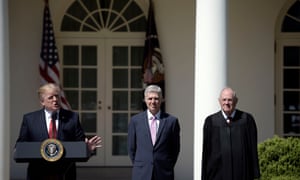Democrats warn successor ‘could radically alter the course of justice’ and help Trump put an enduring stamp on America
The retirement of Justice Anthony Kennedy is a political earthquake that could affect millions of lives and allow Donald Trump to put a stamp on America that will endure long after he leaves the White House.
Presidents come and go, and their policies can swiftly be reversed, as Trump has demonstrated in seeking to erase much of Barack Obama’s legacy. But justices are appointed for life to the supreme court, which plays an outsized role in American life compared to equivalent bodies around the world.
Kennedy’s successor “could radically alter the course of American justice for decades”, warned Nancy Pelosi, Democratic minority leader in the House, adding: “The future of our democracy is at stake.”
And an email from the liberal Center for American Progress Action Fund put it bluntly: “You think this supreme court term has been horrible? If Donald Trump gets to appoint another supreme court justice, we’re staring down 30 to 40 years of vicious, unmitigated attacks on our rights.”
Kennedy has been the critical “swing vote” on the court for more than a decade. He is likely to be replaced by a conservative who might impose new limits on abortion, LGBTQ and voting rights. Now, in what could be the most consequential decision of his presidency, Trump can set the court on a rightward trajectory for decades.
The first meeting of the supreme court took place in 1790. It has
proved one of the crucial checks and balances in US society, testing the
constitutionality of laws passed by politicians, and pushing back when
it deems necessary. Its landmark decisions including Brown v Board of
Education, ending racial segregation in schools, Roe v Wade, enshrining a
woman’s right to abortion, Bush v Gore, which decided the 2000
presidential election, and Obergefell v Hodges, making same sex-marriage
a right nationwide.
Darrell Miller, a law professor at Duke University in Durham, North Carolina, noted that political decisions in the US are more likely to be challenged and turned into constitutional questions that can be litigated than in other countries. “Unlike the UK, we have a fairly robust notion of judicial review,” he said. “The supreme court can rule that acts of Congress and state legislatures are unconstitutional in some way. We don’t have the same notion of parliamentary sovereignty as the UK.”
"The last vacancy was brazenly stolen by shameless Republican leaders. We cannot let that happen again"
However, Kennedy has been a key vote when conservatives have won major rulings on the outcome of the 2000 presidential election, on gun rights, limiting regulation of campaign money and gutting a key provision of the landmark federal Voting Rights Act.
Miller added: “His votes have been pivotal, so his retiring is giving Donald Trump the opportunity select a replacement is likely to be crucial for a hot-button issues that come up in the US.”
Without Kennedy, the court will be divided between four conservative justices nominated by Republican presidents, and four liberal justices named by Democratic presidents. Trump’s nominee – probably from his public list of 25 potential candidates – will face a Senate confirmation process in which Republicans hold the slimmest majority, and it is highly unlikely that Democrats would prevent a vote.

Presidents come and go, and their policies can swiftly be reversed, as Trump has demonstrated in seeking to erase much of Barack Obama’s legacy. But justices are appointed for life to the supreme court, which plays an outsized role in American life compared to equivalent bodies around the world.
Kennedy’s successor “could radically alter the course of American justice for decades”, warned Nancy Pelosi, Democratic minority leader in the House, adding: “The future of our democracy is at stake.”
And an email from the liberal Center for American Progress Action Fund put it bluntly: “You think this supreme court term has been horrible? If Donald Trump gets to appoint another supreme court justice, we’re staring down 30 to 40 years of vicious, unmitigated attacks on our rights.”
Kennedy has been the critical “swing vote” on the court for more than a decade. He is likely to be replaced by a conservative who might impose new limits on abortion, LGBTQ and voting rights. Now, in what could be the most consequential decision of his presidency, Trump can set the court on a rightward trajectory for decades.
Darrell Miller, a law professor at Duke University in Durham, North Carolina, noted that political decisions in the US are more likely to be challenged and turned into constitutional questions that can be litigated than in other countries. “Unlike the UK, we have a fairly robust notion of judicial review,” he said. “The supreme court can rule that acts of Congress and state legislatures are unconstitutional in some way. We don’t have the same notion of parliamentary sovereignty as the UK.”
"The last vacancy was brazenly stolen by shameless Republican leaders. We cannot let that happen again"
However, Kennedy has been a key vote when conservatives have won major rulings on the outcome of the 2000 presidential election, on gun rights, limiting regulation of campaign money and gutting a key provision of the landmark federal Voting Rights Act.
Miller added: “His votes have been pivotal, so his retiring is giving Donald Trump the opportunity select a replacement is likely to be crucial for a hot-button issues that come up in the US.”
Without Kennedy, the court will be divided between four conservative justices nominated by Republican presidents, and four liberal justices named by Democratic presidents. Trump’s nominee – probably from his public list of 25 potential candidates – will face a Senate confirmation process in which Republicans hold the slimmest majority, and it is highly unlikely that Democrats would prevent a vote.

If successful, however, the new justice will not automatically do Trump’s bidding. Miller said: “Assuming that Trump nominates a fairly ideological pick, there will be a lot of pressure on the chief justice to appeal to his [or her] sense of stability and not have the supreme court be just another political arena: an institutional commitment instead of rough and ready politics.”
Malcolm expressed a hope that the new justice will have an “originalist” philosophy like the late Antonin Scalia.
Trump has already been appointing judges – mainly white men – to the lower courts at a historic rate with huge long-term implications. His first supreme court nominee, Neil Gorsuch, was confirmed in April last year after Republicans blocked Obama’s pick, Merrick Garland. Democrats have vowed to block the new nomination until after November’s midterm elections, citing “the McConnell rule”.
Tom Perez, the chairman of the Democratic National Committee, said: “Elections have consequences. The last vacancy was brazenly stolen by shameless Republican leaders with no respect for American democracy. We cannot let that happen again. In November, you won’t just be deciding the next Congress, you will be deciding the direction America goes in for the next half-century.”
Senator Chris Murphy, a Connecticut Democrat, added: “This is a red alert moment for the American people – we need all hands on deck to stop the court from taking a vicious, anti-worker, anti-women, anti-LGBT, anti-civil rights turn.”
The bruising fight on Capitol Hill is likely to include the question reproductive rights. Trump has said he would choose justices who want to overturn Roe v Wade. David Cole, national legal director for the American Civil Liberties Union, said: “If Donald Trump, who has promised to overturn Roe v Wade, picks someone who is anti-choice, the future of Roe v Wade is very much in question.”
The stakes could hardly be higher in the coming months. Jack Goldsmith, a professor at Harvard Law School who clerked for Kennedy, wrote in the Washington Post that his retirement is “the most consequential event in American jurisprudence at least since Bush v Gore in 2000 and probably since Roe v Wade in 1973. His departure leaves the future of US constitutional law entirely up for grabs.”

No comments:
Post a Comment